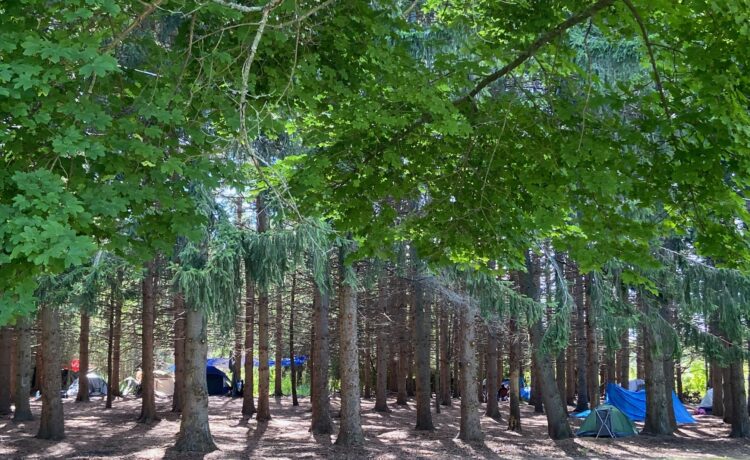The City of Traverse City will soon start receiving a significant boost in annual funding – starting with $365,323 this year – after becoming eligible for the federal Community Development Block Grant program. The program is focused on “providing decent housing, a suitable living environment, and expanded economic opportunities” for low and moderate-income groups. City commissioners will discuss how to spend that funding – including boosting services around housing and homelessness – as part of a busy commission agenda tonight (Monday).
CDBG Funding
With Traverse City forming the seat of the region’s new metropolitan planning organization (MPO) – a status conferred due to the area’s growing population following the last U.S. Census – the city is now eligible to receive Community Development Block Grant (CDBG) funding. Under federal requirements, Traverse City must create a five-year comprehensive plan informed by public input outlining the intended usage of CDBG funds. Following a local stakeholder meeting and online community survey, commissioners will hear tonight from consultant Amanda Warner of Wade Trim on priorities shared by the public so far and eligible activities for funding – with a draft plan to be completed by the end of June prior to a 30-day public comment period and then commission adoption.
According to Deputy City Planner/Sustainability Coordinator Leslie Sickterman, five categories of proposed priorities have been identified so far. The top priority is supporting shelters and services for those experiencing homelessness, including both day shelters and seasonal overnight shelters. “This may include expansion of services, continuation of current service levels, or assistance with capital improvements to enhance the lifespan of the existing facilities or to expand capacity,” Sickterman wrote to commissioners. Funds could also support mental health, substance abuse, and case management services. Addressing homelessness has already been identified as a priority by city commissioners and staff, including this year with improved services at the Pines encampment off Eleventh Street (pictured) and through city financial support for permanent supportive housing at East Bay Flats.
The next highest priority includes assisting with the construction or rehabilitation of housing for low and moderate-income households, seniors, and individuals experiencing homelessness. That could look like working with “community partners to assist with some of the soft costs associated with larger construction projects and hard costs with smaller construction projects,” Sickterman wrote. Third on the list is lowering economic barriers to housing for qualified households and individuals, including “support of fair housing, rental assistance, and down payment assistance program,” according to Sickterman.
Rounding out the funding priorities are supporting the needs of the community’s aging population and supporting community development projects in low and moderate-income areas. The first could include “help qualified individuals make their homes more accessible to allow them to age in place” and “improve accessibility for seniors at public facilities,” while the latter could cover “street and sidewalk upgrades, water/sewer/stormwater upgrades, and park improvements” in certain neighborhoods. The city is on an August 16 deadline to submit its five-year plan to the U.S. Department of Housing and Urban Development, which administers the CDBG program.
Also at Monday’s meeting…
> Commissioners will revisit two topics covered at recent meetings: the TC Downtown Development Authority budget and design options for upgrades at the city’s wastewater treatment plant. DDA board members voted unanimously at a special meeting Thursday to make several changes to the proposed 2024-25 budget with the goal of securing at least five votes needed to pass the budget before a July 1 shutdown. Commissioner Heather Shaw indicated she was willing to change her vote and support the budget based on changes made, putting it on track for likely approval.
Commissioners are also expected to choose one of two design options for a major improvement project at the wastewater treatment plant. The first option is estimated at $26.1 million and focuses on rehabilitating existing equipment, while the second option is estimated at $35.8 million and includes new construction of key equipment. While the second option is costlier, it’s also expected to have a longer lifespan and significantly reduced annual maintenance costs. Consultants assisting with the design process have recommended commissioners go with the new construction option. The city is seeking state funding assistance for the project but will have to bond repairs if that funding request is denied. Costs will be shared with neighboring townships that also utilize the plant.
> Commissioners will vote to approve a $255,960.59 contract with M.L. Chartier Excavating, Inc. for work as part of a state-required pipe project. The city must dig up 364 pipes at the curb stop – a random sampling of the city’s total supply – to determine what type of pipe is in place from the curb stop into the private adjacent building or home. That work is mandated under changes to the state’s Lead and Copper Rule in 2017. M.L. Chartier Excavating, Inc. was the lowest of four bidders to handle hydro-excavating at the 364 curb stops, determining the pipe material type, and completing the necessary restoration. The city is also in the midst of a multi-year project to replace hundreds of service lines required under the same state rule changes. The city has received funding assistance in the form of both a low-interest loan and a $2 million earmark grant from the state to comply with the Lead and Copper Rule.
> Commissioners will vote to approve renewing a three-year contract for the Traverse City Police Department to provide a school resource officer to Northwest Education Services. Costs are fully reimbursed by the school system to the city to have an officer present during the school year.















